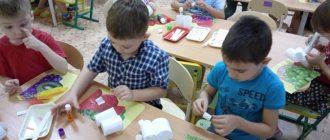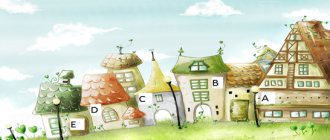Child development is not only a complex, but also a contradictory process, which means the transformation of a child as a biological individual into a social being, i.e. personality.
The influence of society on the development of a child’s personality
Society plays an important role in the development of the personality of each person, since it is by living among society that we also become people, accept or reject norms, rules, agree with other people’s opinions or impose our own.
A person without society grows up in the likeness of an animal, and science has seen confirmation of this fact more than once: children raised by a pack of monkeys, wolves or dogs were rather behaviorally “more animal than human” - they were absolutely not adapted for life in society. It is society that makes a person an individual capable of living with his own kind and getting along in this world among people.
What is socialization?
A person by nature needs recognition and approval from the people around him, be it parents or friends. When a baby has just begun to get acquainted with this world, in addition to his physical needs, the praise of family and friends and a high appreciation of his merits are extremely important to him. As the child grows up, such an assessment provides him with confidence in himself, in his strength and in his uniqueness. Expanding the boundaries of his knowledge in society, the child is “cut down” by his further environment - his friends do not admire his talents as much as his parents; educators and teachers are completely torn between 20–30 children, often not devoting more than 10 minutes individually to each child. This is socialization, the child’s adaptation to the society around him.
Society is a community of cultures, living conditions, traditions, rules and norms of life; it is important not only how the child understands society, but also how positively society will accept the child. There are often cases when an absolutely normal child, without any mental disabilities, simply with his own artistic or dreamy view of this world, getting into society, did not feel comfortable there. People do not like very different individuals, especially if it is impossible to break them and impose their point of view. However, a child must learn to live in society, to coexist with other opinions, other people’s actions, because each of us depends on the other, and by rejecting the norms and rules of society, a person will feel unclaimed and unnecessary, and this will negatively affect his psycho-emotional state.
A child is already born with a certain status in society, for example, based on the country and family in which the child was born, we can safely say that he is, for example, a son, a German, an aristocrat - this is already an innate status that a little person will not change. But as he grows up, he can acquire other statuses with the help of certain social groups, for example, schoolboy, student, spouse, deputy, officer, etc. Depending on the status of his parents, the child will strive to obtain one or another position, achieve certain goals - and this is one of the merits of society, because the desire to obtain a certain status directly depends on position and approval in society.
And if a child gradually grows into a human being in society, then in most cases his uniqueness will be lost. Kids, who do not yet know about social norms and rules, always tell the truth, do not be hypocrites, talk about their every feeling and sensation - they are free in their “confession”, and that’s why they are so happy. Both at home and outside, the child begins to be put into frames - “this is not possible,” “this is wrong,” “this is uncivilized,” “you are doing badly,” “they don’t do that,” and everything in the same spirit. As a result, the free bird that just recently fluttered in the child’s soul gradually understands that in order to live in society, you need to obey the rules, you need to overpower yourself, in most cases, accept other people’s opinions, even if you think completely differently. And if someone shows too much of their “I” to everyone, they may not understand him, which is why many children, distinguished by their individuality and rebellious opinions, are often outcasts among their peers and society as a whole.
Factors influencing socialization
The socialization of a child is influenced by many factors, and first of all they depend on the environment surrounding the baby.
Microfactors
From birth, a child is in a microsociety, and it is this microsociety that has the greatest influence on his development. Microfactors that influence the socialization of a little person are family, kindergarten, school, peers, friends and classmates, that is, those groups that are in undeniable proximity to the child, with whom he encounters every day.
As a child grows, more and more people come into his life. These are relatives - mother, father, grandmothers, grandfathers, uncles, aunts, sisters and brothers. Then the circle of communication is supplemented by educators, peers, teachers, classmates, and friends. The older the baby, the more microfactors influence him.
Mesofactors
This is a more generalized influence on the child, which forms his broad horizons and understanding of what is happening. Mesofactors include regional living conditions, type of settlement (metropolis, small town, town, village), ethnic attitudes, which in the same country, but in different parts of it can be completely opposite, as well as mass media (TV, Internet , newspapers, news).
Macro factors
If we consider the country as one of the factors influencing the child, then it will be a macro factor, since it is more global. Planetary, global, economic, environmental, demographic processes - these are the significant and undeniably important macrofactors influencing human socialization. People of the north are very different from the south, just as people in the east have completely different foundations than the “advanced” west. Therefore, in each country, class, and climate zone, socialization occurs differently. And this largely depends on the culture in which the child grows up, since it is this culture that determines the social norms and values for a given class. The child must understand that there are people with a different culture, with different life values, with a different way of thinking - and this difference must be accepted, not condemned or fought with it, but simply get to know other peoples and get to know the world.
The influence of society at different age periods
As a child grows up, the number of social institutions that influence the development of his personality increases significantly, some fade into the background, others gain primacy. But each institution has its own educational significance, so ignoring at least one of them will lead to an unacceptable omission in the development of the child’s personality.
The influence of society on a child under 3 years of age
While the baby is still very small, he is influenced exclusively by microfactors, that is, family and immediate environment. The family is the most positive and loving social institution that raises a child in “greenhouse” conditions. These are those golden years when family and friends have an undeniable influence on the development of the child’s personality, and parents need to try to instill in their child all the best qualities that in the future will help him take a worthy place in society. The main task of parents is to form a positive emotional sphere for the little man and influence his external behavior, that is, from the first years of life, the baby must know and obey the basic rules of discipline and hygiene.
The influence of society on a child in preschool age
During this period of life, the influence of society on the child’s development becomes more diverse, as the child becomes familiar with the rules and guidelines of society. A child’s communication with peers in kindergarten is of enormous importance in the further formation of the child’s personality, because it is among them that the child learns to achieve his goal, understands how and with what he can receive praise not only from mom and dad, but also from other adults, that is educators. In a playful way, the child learns to interact with other children, and certain moral standards are established. Those who spent the entire 6 years at home instead of kindergarten before school do not have such a rich experience of communicating in society that they cannot positively influence the character and personality of the child.
An undeniable contribution to the socialization of the child is made by role-playing games, which prevail in groups in kindergarten. Seeing the style of behavior in his family, the child tries to impose it on others in the game, but is faced with the fact that peers may have their own opinions and their own rules. This way the child learns that not everyone’s family and communication rules are the same, and in older preschool age children learn cooperation at a basic level.
Another question is, which kindergarten should you send your child to? Today we are hearing more and more about such a concept as a kindergarten “at home”, where there are only 5–10 children in a group, and not 20, as in a regular preschool institution. The fewer children in the group, the more attention the teacher can pay to each of them, and this is extremely important in the development of thinking, the development of kindness and responsiveness in the child’s heart.
The influence of society at primary school age
The upbringing and influence of the family at the moment when the child goes to school weakens by at least half, since now for the child the school is the main educational institution. Here, the child in real time gets the first idea of real society, about discipline, order, respect for other people’s opinions, about learning in general, about the norms and rules of communication, about the difference between communication with peers and with older people in status, then eat with teachers.
At this age, the authority for children is undoubtedly adults - parents and teachers, and this is probably the last step when adults can still instill in a child the right thoughts and actions. The school should be the main educator of the child’s personality, even though it is aimed at teaching, not education.
The influence of society on a child during adolescence
Remember yourself as a teenager - the influence of the family is negligible, we absolutely do not listen to our parents, but now socialization outside the home becomes our main task.
Authority among peers, the turning point from a dependent child to independence - this is one of the most important and difficult periods in a person’s life. The child spends most of his time among his peers, and after school he does not go home, but goes for a walk outside, and so on every day. Now the influence of society on the development of a child is enormous - his company, the people around him whom he has chosen as friends, their attitude towards him, authority or persecution. A person becomes independent, he improves himself so that his point of view is listened to, so that he is part of society, so that he is not expelled from society, because now all life is continuous communication, and without norms and rules it is practically possible to survive among one’s own kind impossible.
The influence of society on a child in adolescence
When a teenager enters adolescence, the family is no longer an educational institution for the vast majority of people. Now the formation of personality is influenced by the environment in which he is located - company and friends. Those personality traits that have developed in the child up to this point undergo some changes or are further strengthened depending on the social circle in which the child finds himself, depending on situations, on the ability to cope with them, depending on the character and type of temperament of the young person .
And if previously a child lived in society, relying on his parents, knowing that they would always help, advise, and come to the rescue, then at the age of 16–17 years people themselves solve their problems to the best of their ability, without involving adults in this. However, the development of personality in adolescence depends not so much on the influence of society, but on the activity and desire of the child to live in it. A person himself makes a decision - to obey certain norms and rules, or to protest against them.






